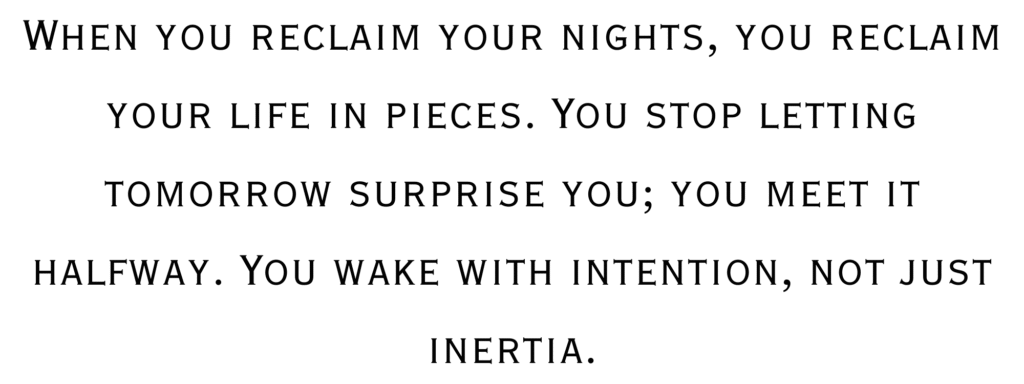Our days often get all the credit. We think success depends on how early we wake up, how much we get done, and how disciplined we are from sunrise to sunset. But there’s a quieter part of the day that holds just as much — if not more — influence over who we become: the evening.

Evenings are like a gentle whisper before the storm of a new day. They’re the space between what was and what will be. How you spend them can either build you up or quietly undo all the progress you’ve been fighting for. An evening habit isn’t just about winding down; it’s about planting the seeds for tomorrow’s growth.
Why Evenings Matter More Than You Think
Most people focus on morning routines. And for good reason — mornings set the tone. But here’s the truth: your mornings often reflect your nights. A chaotic evening usually leads to a restless sleep, rushed waking, and a scattered morning.

Think about it. If you stay up scrolling, worrying, or mentally replaying every awkward moment of the day, how do you feel when the sun rises? Heavy. Tired. Behind. Already fighting uphill.
But when you treat your evenings as a space for care — not just self-care in the spa-like sense, but intentional alignment — you give yourself a head start. The next day stops being a battlefield and starts becoming an unfolding of what you quietly prepared for.
Evenings matter because they close loops. They are where your mind digests everything. And when you do that consciously, you sleep deeper, wake clearer, and start trusting yourself more.
The Habit That Changes Everything
One powerful evening habit doesn’t have to be complicated. It’s about reflection and preparation. You can call it The Reset Ritual. Here’s the essence: before bed, pause to acknowledge the day — then gently set tomorrow in motion.
Here’s what that can look like:
1. Reflect:
Ask yourself three simple questions:
- What went well today?
- What could have gone better?
- What am I grateful for right now?
This isn’t about judgment. It’s about awareness. When you see your day clearly — not through criticism, but through curiosity — you train your brain to learn from living.

2. Release
Consciously let go of whatever you can’t fix tonight. Write it down if it keeps spinning in your mind. Tell yourself, “This belongs to tomorrow, not tonight.” That small act tells your nervous system it’s safe to rest.

3. Reset
Choose one priority for tomorrow. Not ten, not five. One. Decide it now so you don’t waste mental energy in the morning. If you know what matters most, you begin the next day already pointed in the right direction.

This habit takes less than fifteen minutes. But what it gives back is enormous: peace, focus, and a sense that you’re steering your own life, not just reacting to it.
Why This Works
Your brain thrives on closure. We rarely give it that. We keep mental tabs open like an overloaded browser. Each unfinished thought quietly drains us. But when you reflect, release, and reset, you close those tabs. You tell your brain, “We’re good for now.”

On a neurological level, this creates psychological safety. You no longer fall asleep mid-worry. You enter sleep with less resistance, which means your brain does its real night work — repairing, integrating, storing memories — more effectively.
On an emotional level, it builds trust with yourself. Every time you keep a small promise — even just writing down what matters for tomorrow — you send a message: I take my life seriously enough to guide it. That trust becomes confidence. And that confidence builds momentum.
Tiny Adjustments, Big Shifts
You don’t need a perfect ritual. You need a consistent one. Start embarrassingly small. Maybe tonight, all you do is write down one thing you’re grateful for. Or you pick your clothes for tomorrow. Or you silence notifications. It doesn’t matter how grand it is; what matters is that it’s intentional.
Momentum loves consistency. Tiny evening shifts often spark surprisingly big changes:
- Less anxiety in the mornings.
- More energy without changing your wake-up time.
- Greater clarity on what actually matters in your day.
- A subtle but profound increase in self-respect.

And when you respect yourself, habits stick. You’re no longer forcing yourself into routines out of guilt; you’re moving through them because they match who you want to be.
Reclaiming the Quiet Hours
Evenings, for many of us, are escape hours. We binge, scroll, snack, numb out. Not because we’re lazy — because we’re depleted. The world has asked too much of us. We reach for comfort, even if it steals tomorrow’s energy.
But there’s a different kind of comfort — one that nourishes rather than drains. It’s found in closing your eyes knowing you took care of your inner world before sleep. That’s the power of an evening habit.

And over time, something subtle but powerful happens: you begin to trust the flow of your days. You see progress without the panic. You see yourself evolving not in leaps but in quiet, steady steps — the kind that last.





